#Judy Mayhan
Explore tagged Tumblr posts
Text
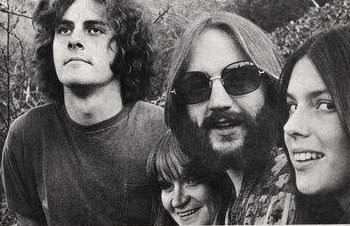
Peter Tork and/or Release, 1969.
“After quitting [The Monkees], Tork tried to launch a new band called Peter Tork and Release. The fact that he’d been in the Monkees may have made it harder to gain respect, he said, but his fame also gave him advantages over other new bands. The pluses and debits of being an ex-Monkee balanced out, Tork thinks. Release failed, he says, because ‘I didn’t know how to stick to it. I ran out of money and told the band members, “I can’t support us as a crew any more, you’ll just have to find your own way.”’ In hindsight, Tork says, he should have asked the others to help support the band and hang with it after he could no longer afford to be its sugar daddy. But at the time, Tork says, he lacked the self-esteem to ask for other people’s help.” - Los Angeles Times, October 20, 1992 “I had a group called Release, which I couldn’t keep together because I didn’t know enough about management. [We recorded] just a few basement tapes. Actually they were attic tapes.” - Peter Tork, Goldmine, May 1982 “[Judy Mayhan] had played the folk circuit and worked as a waitress at New York’s famous Gaslight Club when she met Peter Tork […], who helped her along in the business.” - The Columbia Record, December 18, 1971 “According to Judy, Peter is another one of those good guys. It seems he frequently opens his doors to needy guests.” - Star-Gazette, March 7, 1970 “That [‘Peter Percival Patterson’s Pet Pig Porky’] was taught to me by Judy Mayhan, who was a singer that I worked with and managed for a time — she had an album on Elektra. It was just a thing she had heard at a nursery school. I got credited for it [on the album] because Screen Gems never asked me who wrote it. It’s actually public domain.” - Peter Tork, Pisces, Aquarius, Capricorn & Jones Ltd. CD liner notes, 1995 “[There were recording] sessions that Peter produced himself BEFORE I got that opportunity [at Muscle Shoals Sound Studio]… and it was Peter that made that opportunity possible to begin with… He was a very important person in my life and did his best to guide me… […] Peter told me many years ago that he had no clue as to what happened to all those recordings.” - Judy Mayhan, via Forrest George on Facebook, February 21, 2019
#Peter Tork#Tork quotes#60s Tork#90s Tork#10s Tork#Judy Mayhan#Reine Stewart#Riley Cummings#Release#Peter Tork and/or Release#The Monkees#Monkees#long read#can you queue it
13 notes
·
View notes
Video
youtube
Morning And An Oldsmobile - (cover) Dan McNay
0 notes
Photo
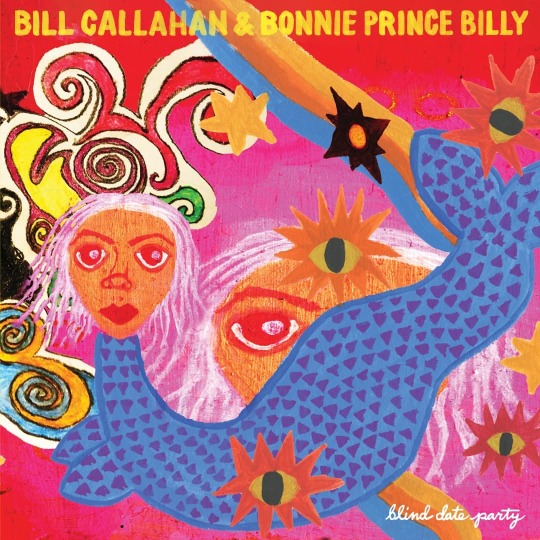
Antikörper-Tipp: Bill Callahan & Bonnie ‘Prince‘ Billy – Blind Date Party * IT'S THEIR PARTY AND THEY'LL CELEBRATE IF THEY WANT TO! You're invited to Bill & Bonnie's Blind Date Party on 2xLP/2xCD/2xCS on December 10th this year! * The Blind Date Party hosted by Bill Callahan and Bonnie ‘Prince’ Billy and featuring AZITA, Matt Sweeney, Alasdair Roberts, Matt Kinsey, Sean O’Hagan, Bill MacKay, George Xylouris, Dead Rider, David Pajo, Mick Turner, Meg Baird, Ty Segall, Emmett Kelly, Cory Hanson, Six Organs of Admittance, David Grubbs, Cassie Berman, Cooper Crain and Sir Richard Bishop happened online in the fall and winter of ’20–’21 — but party planning began in the spring of 2020, when, stuck at home, with no gigs in the foreseeable future, Bill, Bonny and Drag City needed an outreach program to keep themselves busy/sane/solvent. In the absence of everything else, playing songs they loved was a good idea; playing with people they loved, a great desire. And making it fun by pairing someone with someone else with no say in the matter - the essence of the blind date - was the plan. Favorite songs were chosen; players from around the Drag City galaxy messaged. Pretty soon, songs began to fly through the air! And thus, they were entertained throughout the summer of 2020, when so much else in the world seemed so completely wrong. In the fall, the finished work started to appear online: Bill and Bonny singing a song by someone they loved and admired; each song cut by another artist they loved and admired and sent to Bill and Bonny for finishing touches. The spotlight pointed in every direction each week: toward the singers and writers who’d originally played the songs: Yusuf Islam, Hank Williams Jr., Dave Rich, The Other Years, Billie Eilish, Steely Dan, Lou Reed, Bill Callahan, Jerry Jeff Walker, Robert Wyatt, Judy Mayhan, Johnnie Frierson, Demis Roussos, Will Oldham, Leonard Cohen, David Berman, Iggy Pop and John Prine. #antikorpersession #antikoerpersessions #bytefm #newalbum #blinddateparty #album2021 #dragcity #dragcityrecords #albumreview #vinyl #recordcollector #billcallahan #bonnieprincebilly #willoldham #newvinyl #albumrelease #smog https://www.instagram.com/p/CWNgFyVsjPn/?utm_medium=tumblr
#antikorpersession#antikoerpersessions#bytefm#newalbum#blinddateparty#album2021#dragcity#dragcityrecords#albumreview#vinyl#recordcollector#billcallahan#bonnieprincebilly#willoldham#newvinyl#albumrelease#smog
0 notes
Video
youtube
So lovely, I think I need more.
0 notes
Text

Release (aka Peter Tork and/or Release): Riley Cummings, Judy Mayhan, Peter Tork, and Reine Stewart.
“I did have such a lovely house for a little while, but overshot the mark. It had a big lovely swimming pool and a good music room where we could get pretty loud. Jimi [Hendrix] did come over to my house. Buddy Miles and I were close for a while and both of them would come over and say hello.Once [Stephen] Stills and David Crosby and my then girlfriend and I were jamming together and I leaning into the drums something ferocious, banging on cymbals and lashing out pretty good, until a city councilman and a cop came over and we were so loud that we drowned out conversation down the hill, apparently.” - Peter Tork, Review Mag, May 27, 2016 “Peter wants to do some recording on his own, something he seldom got to do as a Monkee. He did, however, write two songs for the ‘Head’ soundtrack and these, he believes are representative of his music of the present. He tried a while back to get a group together with his brother Nick, but it didn’t work out.” - article by Ann Moses, New Musical Express (NME), January 25, 1969 “Three is a quorum for our group. We sometimes have four. We’re thinking of having a rotating fourth. Right now the fourth is that girl that I’m promoting named Judy Mayhan. […] If I was just having a back-up band I could go into the Musicians Union and hire a bass, drums and organ. But I’d rather work with friends because that makes much better music.’” - Peter Tork, New Musical Express, April 5, 1969 “I had a group called Release, which I couldn’t keep together because I didn’t know enough about management. [We recorded] just a few basement tapes. Actually they were attic tapes.” - Peter Tork, Goldmine, May 1982 “After quitting [The Monkees], Tork tried to launch a new band called Peter Tork and Release. The fact that he’d been in the Monkees may have made it harder to gain respect, he said, but his fame also gave him advantages over other new bands. The pluses and debits of being an ex-Monkee balanced out, Tork thinks. Release failed, he says, because ‘I didn’t know how to stick to it. I ran out of money and told the band members, “I can’t support us as a crew any more, you’ll just have to find your own way.”’ In hindsight, Tork says, he should have asked the others to help support the band and hang with it after he could no longer afford to be its sugar daddy. But at the time, Tork says, he lacked the self-esteem to ask for other people’s help.” - Los Angeles Times, October 20, 1992 “[Judy Mayhan] had played the folk circuit and worked as a waitress at New York’s famous Gaslight Club when she met Peter Tork […], who helped her along in the business.” - The Columbia Record, December 18, 1971 “According to Judy, Peter is another one of those good guys. It seems he frequently opens his doors to needy guests.” - Star-Gazette, March 7, 1970 “[There were recording] sessions that Peter produced himself BEFORE I got that opportunity [at Muscle Shoals Sound Studio]… and it was Peter that made that opportunity possible to begin with… He was a very important person in my life and did his best to guide me.” - Judy Mayhan, via Forrest George on Facebook, February 21, 2019
#Peter Tork#Tork quots#60s Tork#70s Tork#long read#Judy Mayhan#Reine Stewart#Riley Cummings#Release#Peter Tork and/or Release#The Monkees#Monkees#can you queue it
8 notes
·
View notes
Photo

Peter Tork with Jim Gibson and Dennis Witcher. Photo courtesy of Jim Gibson, used with permission.
“Really all I’ve ever wanted to do was play in a band.” - Peter Tork, In This Generation tour, May 2013
Having decided to leave the whirlwind of The Monkees, Peter sought to pursue his love of music with full dedication. Returning to his roots, namely his years spent performing in Greenwich Village and with acts such as the Phoenix Singers, he dedicated himself into playing with, as he would later put it, “group after group after group.” (Enigma Online, 2015)
In the wake of Peter’s departure from The Monkees in late 1968, he proved busy, forming Release, helping Judy Mayhan secure a record deal (and managing her for a time), working with his friend Bobby Hammer on a film company venture (Breakthrough Influence Company), consulting at a Humanities Seminar in Colorado in 1969, performing at a Spirit Movement 1969 event — and connecting with fellow musicians.
Following the trail of the above photograph led to an interview with Jim Gibson, who was kind enough to generously give of his time and offer insight into one of Peter’s musical collaborations. This post presents the highlights of that interview. A note before you begin to read: Since Mr. Gibson’s comments are extremely insightful, I’ve included minimal narration, italicized.
Connecting with Peter...
Jim Gibson: “I was playing guitar and singing in clubs around Los Angeles. I was also working at a publishing house playing guitar on demos and working on song writing. The publishing house was owned by Stephen Stills. The team that ran the publishing company also worked as a management team. […] [In the wake of Peter’s departure from The Monkees] Stephen offered his team to help Peter get back up and running.”
Peter and Stephen, of course, had been friends since their Greenwich Village days, where they’d performed together, including as a trio with John Hopkins. Eventually, they met up again in California, where they once more performed occasionally; for a time, Stephen lived at Peter’s house, and famously recommended Peter to the creators of the NBC show The Monkees.
Tork, Gibson, and Witcher...
Jim Gibson: “The team had put me and Dennis [Witcher] together and we played as a duo all over Los Angeles area. Dennis played guitar, bass and mandolin. We both sang as well. So the team had us playing together for a while and I guess when they thought we worked together well, they had us audition for Peter. It was a casual meeting, we met at the studio and played a few songs. I guess Peter liked what he heard and felt. So the Team started booking us on gigs.”
Impressions of Peter...
Jim Gibson: “In my eyes, Peter was a seasoned pro. He was easy going, humorous and took his music very seriously. He shared his musical knowledge in a nice way. He knew what he wanted to hear and how the music should feel.”
During his Greenwich Village days, Peter had made a name for himself, as fellow musicians and collaborators such as Lance Wakely and Bruce Farwell remembered. And, as Peter himself would say, “I never was frightened about my abilities to perform live in music. [...] I did it for two and a half years solid, then I got the Monkee part and I only played a few odds and ends of bass. But, you know, I mean, I played, Lord, I was doing a lot of that, I mean, I was getting standing ovations as an unknown folk singer in engagements in days beforehand.” (Headquarters radio, 1989) Subsequently, Peter was understandably determined to play music as he had done prior to what he termed “that operation” in his June 1983 interview with NPR.
Bookings as “Peter Tork”...
Jim Gibson: “When the booking agents suggested billing the band as ‘Peter Tork, formerly of the Monkees’ Peter wanted nothing to do with that. He insisted that it would be just ‘Peter Tork.’”
The gigs...
Jim Gibson: “We started out as a trio, playing live gigs. We opened up the show for bands on tour, such as ‘Fog Hat’ ‘The Blues Image’ and many more.
We played concerts at colleges where we were the headliners. As a trio Dennis played bass, I played guitar and Peter would switch around from Guitar to banjo to piano. He was quite versatile and the music flowed.”
When asked about the music the trio played...
Jim Gibson: “The type of music we played had a folk, rock vibe and ranged from Peter’s original songs, with classic blues thrown in.”
And Peter’s generosity, consistently documented by recollections from his friends and colleagues over the years, was on display during this time period as well.
Jim Gibson: “He was also very generous on stage and would have Dennis do a few of his songs and also featured me doing my songs while he played a supporting role.”
A memorable performance...
Jim Gibson: “There are many stand out memories, but One stand out memory was when the trio was asked to come play a set at a Hollywood Diner, sort of a fund raiser to keep the Diner open for business. After our set, I walked inside the Diner and there was Harry Nilsson sitting at the bar having a drink. Harry invited me to join him and we had a good time telling jokes and having a few drinks. Harry was one of my favorite artists/singer/songwriter.”
Once more, it became clear that Peter hadn’t forgotten his Greenwich Village days, and the joy of playing the stages of more intimate venues. As he would later say, during the whirlwind of The Monkees years, he “missed the easy, street-level camaraderie of my Greenwich Village days.” (Uncut, 2019)
Jim Gibson: “Peter did talk about those Greenwich Village days. Always good memories and good stories. After a year or so, Dennis Witcher left the trio and started playing with another local band. At that point, Peter and I decided to continue as a duo. We started playing coffee houses in Venice California, and Santa Monica. It felt great. Usually just two acoustic guitars. Peter would often times turn the show over to me and then return to stage and we’d finish it off together.”
Working together gave Jim Gibson an insight into Peter, the musician — and the person.
Jim Gibson: “Peter always looked for the humorous side of things, it was important to keep it light. Peter was 10 years older than me, I was in my early 20’s when we connected. He could have had any guitar player, but he went with me. I was new at it all, he was like a big brother showing me how it’s done. What to watch out for, how the show must go on, and be ready for what ever could happen.”
Sharing the stage would leave a lasting impression on both musicians. And, just like the “easy, street-level camaraderie” of Peter’s Village days, music and friendship defined these moments in his life and career. It was a juncture Peter clearly didn’t forget.
Jim Gibson: “Many years after Peter and I went our own ways, I was playing at a blues club in Los Angeles, when in walks Peter. I had to look twice, I asked him what he was doing there at the club. He responded by saying, he saw my name on the marquee and had to drop by to see me and say hello. We hugged and he sat in for a few songs. Had a blast. He was a good person, friend, mentor and great entertainer.”
Please be sure to visit Jim’s website for more about him and his music.
My gratitude to Mr. Gibson for so generously taking the time to reflect on his memories of Peter. His insights have augmented this fan page considerably, and I’m enormously appreciative.
#Peter Tork#Tork quotes#Jim Gibson#thislovintime interviews#Stephen Stills#long read#Harry Nilsson#Judy Mayhan#Dennis Witcher#Tork performances#Tork songs#60s Tork#70s Tork#can you queue it
18 notes
·
View notes
Photo
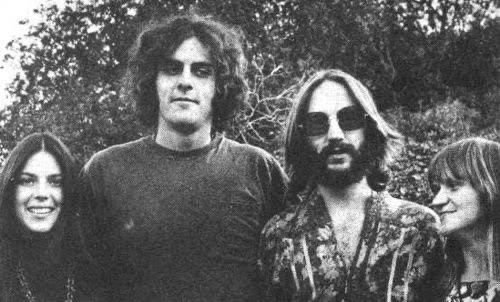

Release (Peter Tork, Reine Stewart, Judy Mayhan, and Riley Cummings), 1969.
“[Judy Mayhan] had played the folk circuit and worked as a waitress at New York’s famous Gaslight Club when she met Peter Tork […], who helped her along in the business.” - The Columbia Record, December 18, 1971
“According to Judy, Peter is another one of those good guys. It seems he frequently opens his doors to needy guests.” - Star-Gazette, March 7, 1970
“Shortly after the [Factory and] Fraternity [of Man] party ended, [Lowell George] took on a job for Peter Tork of Monkees. Tork quit the group [...], was doing some teaching, formed a production company [ed. note: Breakthrough Influence Company (BRINCO)], and managed a folk singer, Judy Mayhan. One of his students was a cousin of Lowell’s, and Peter gave him a call, inviting him to help with the music for demo for Atlantic Records. Mayhan got the deal, [but] Tork was soon out of the picture.” - Ben Fong-Torres, Willin’: The Story of Little Feat (2013) (x)
“That [‘Peter Percival Patterson’s Pet Pig Porky’] was taught to me by Judy Mayhan, who was a singer that I worked with and managed for a time — she had an album on Elektra. It was just a thing she had heard at a nursery school. I got credited for it [on the album] because Screen Gems never asked me who wrote it. It’s actually public domain.” - Peter Tork, Pisces, Aquarius, Capricorn & Jones Ltd. CD liner notes, 1995
#Peter Tork#Reine Stewart#Judy Mayhan#Riley Cummings#Release#Peter Tork and/or Release#1969#60s Tork#Tork quotes#long read#The Monkees#Monkees#PACJ#Pisces Aquarius Capricorn & Jones Ltd#Breakthrough Influence Company#Little Feat#Peter deserved better#Star-Gazette#The Columbia Record#can you queue it
29 notes
·
View notes
Photo

Peter Tork, 1969.
“[After leaving The Monkees] I was about to push off and do something. Word got to me that Bert [Schneider] and Bob [Rafelson] had a project in mind. A couple of young outlaw actors had gone into New Orleans and shot some footage in graveyards, and they thought they were into something hot, and they brought it to Bert. And Bert said, ‘Yeah, let’s see what we got here.’ And the result was Easy Rider. Now, I heard about this, and I said, ‘I’ll write the theme song. I’ll write the theme song for the movie, it’ll be great.’ So I wrote the song with some friends, and I played it for Bert, and Bert said, ‘Well, we’ve decided to go a different way. We have a couple of other composers named Dylan and McGuinn.’ And you’re out on your own — no, they didn’t.” - Peter Tork, In This Generation show, May 2013
"Easy Rider" (Tork), live with James Lee Stanley: here.
#Peter Tork#Tork quotes#Tork songs#60s Tork#Release#Peter Tork and/or Release#Reine Stewart#Riley Wildflower#aka Riley Cummings#Judy Mayhan#Easy Rider#Bert Schneider#Bob Rafelson#The Monkees#Monkees#lost Tork songs#what if... of Tork history#Peter deserved better#<3#<333#1969#can you queue it
27 notes
·
View notes
Photo

Release (Peter Tork, Reine Stewart, Judy Mayhan, and Riley Cummings), 1969.
The May 8, 1970 issue of The Communicator included an ad for a three-day Peace Bowl rock festival, with the bill featuring Peter Tork &/or Release, alongside Ravi Shankar, Flying Burrito Brothers, Jose Feliciano, Steve Winwood, Procol Harum, and others.
“Festival Canceled Toronto (AP) — A peace festival scheduled to be held at Toronto’s Varsity Stadium June 19-21 has been canceled due to financial difficulties, it was announced Friday. Roland Paquin, production manager for the festival billed as Peace Festival 70, said in an interview he had been informed of the cancellation by the show’s producer, Murray O. Caulfield. The festival was to feature such performers as Country Joe and the Fish, Peter Tork formerly of The Monkees, Chubby Checker and Love.” - The Ithaca Journal, May 18, 1970
#Peter Tork#Release#Tork quotes#Peter Tork and/or Release#70s Tork#Ripley Wildflower#Reine Stewart#Judy Mayhan#et al#1969#1970#what if... of Tork history#Tork performances#Tork festival appearances#The Ithaca Journal#can you queue it
14 notes
·
View notes
Text

In Chicago, October 1983. Photo by Paul Natkin.
“‘I absolutely refused to do those [Monkees] songs for a long time,’ he says. ‘But now I know part of the reason people come is relive their early days. They expect it, and I can’t ask them to share my angst. Besides, they’re really not bad songs.’ […] ‘I had this abstract notion that a band should write and create their own music,’ he says. ‘I wanted to go on doing that, but I met a lot of resistance from the other guys, each for his own reason. The best I could get was the right to play on the albums. It took me a long time to get that straight and accept it with any amount of grace. ‘I was also starting to feel the sting of the accusations of being a plastic group,’ he says, ‘which is like criticizing a horse for not being a deer. The Monkees was a multimedia operation, a single integrated notion of a TV show, records and concerts. I understand John Lennon to have said he wouldn’t want to have tried to do what we did.’ And so Tork abandoned pop stardom but stayed in Los Angeles, dabbling in production and managing singer Judy Mayhan. ‘It didn’t work out,’ he admits. ‘I was very young, I believed that talent was its own reward and its own justification.’ […] ‘[M]y attitude up until two or three years ago was essentially, “It’s my life and I can do what I want so get off of my back." ‘At the same time I was very happy-go-lucky, breezing through life not getting too hung up over anything. That’s what got me the part [on the show]. It was kind of an interesting contrast, and now that I think about it really doesn’t jibe. I chose to profess that (The Monkees( held no attraction for me, but found that it held an attraction I wasn’t aware of.' […] ‘Mike and I call each other from time to time to tell each other jokes. I had a couple of sodas with [Micky] a few months ago, now he’s in London directing the stage version of Bugsy Malone and working in children’s television. And [Davy’s] still performing, as well as riding and breeding horses, something he’s always wanted to do.’ There has, he adds, been serious talk of a real Monkees reunion. ‘But nobody’s going to drop everything to do it, because at this point, it’s not going to rescue anyone. It wouldn’t be something we just throw together. I would demand seriously good new material, and so would Mike. It’d have to be worth our while in terms of money and audience — maybe a tour, a TV special or even a video, which of course Mike would want to have a large hand in.’ But what’s most important right now is credibility, Peter Tork’s credibility. ‘I have musical credentials,’ he says. ‘I want people to know I’m a showman. I don’t want to just remind them of the old days and send them home — I am an entertainer.’” - The Toronto Star, May 3, 1983 (x)
#Peter Tork#Tork quotes#80s Tork#60s Tork#The Monkees#Monkees#long read#<3#Peter and Michael#Peter and Micky#Peter and Davy#can you queue it
44 notes
·
View notes
Photo
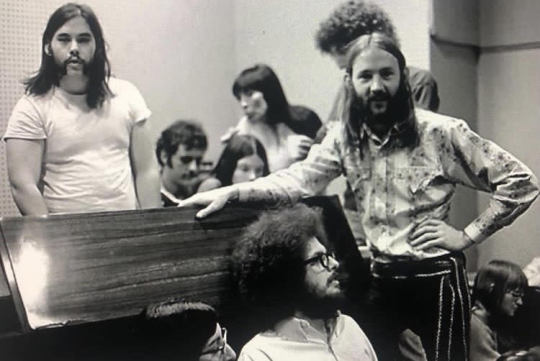
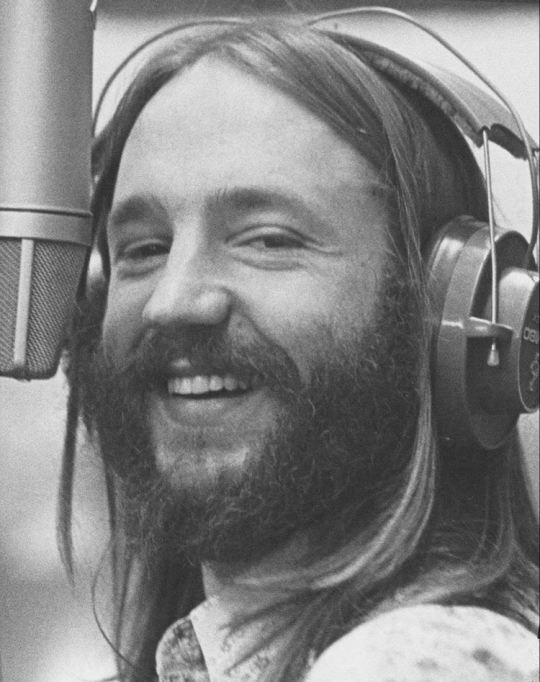
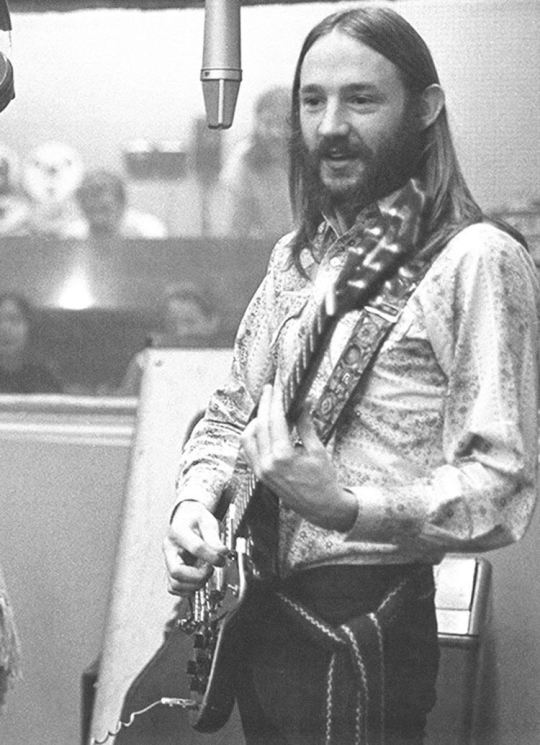
Peter Tork in the studio with Lowell George, Reine Stewart, Judy Mayhan, and others; photos by Nurit Wilde.
“Shortly after the [Factory and] Fraternity [of Man] party ended, [Lowell George] took on a job for Peter Tork of Monkees. Tork quit the group early in 1969 [ed. note: actually late 1968], was doing some teaching, formed a production company [ed. note: Breakthrough Influence Company (BRINCO)], and managed a folk singer, Judy Mayhan. One of his students was a cousin of Lowell’s, and Peter gave him a call, inviting him to help with the music for a demo for Atlantic Records. Mayhan got the deal, [but] Tork was soon out of the picture.” - Ben Fong-Torres, Willin': The Story of Little Feat (2013)
“I had a group called Release, which I couldn’t keep together because I didn’t know enough about management. [We recorded] just a few basement tapes. Actually they were attic tapes.” - Peter Tork, Goldmine, May 1982
“Tork did form a group after The Monkees, named Release, but none of the band’s records efforts managed to escape Tork’s hillside mansion practice room. ‘We recorded some demos,’ Peter says, ‘but I think they’re lost. It was just a garage band, no particular skill or charm. I also did a demo for Atlantic Records. Ahmet Ertegun gave me a session to see how I would do, but it wasn’t good enough.’” - Head 1994 liner notes
“Briefly last year I considered putting together a RELEASE forty years later retrospective article; it never happened, and I only got as far as speaking with Reine Stewart on the phone (I had also spoken with RELEASE 'fourth' member Judy Mayhan in 2002). According to Stewart, RELEASE were supposed to go to Muscle Shoals as the backing band for Judy Mayhan's Atlantic Records solo album (a record deal brokered by Peter Tork). I can't remember who she told me had kaiboshed this plan, possibly Ahmet Ertegun, whom she described as a longtime friend. Anyways, she expressed this with regret -- said the album would have been much better with her, Tork and Riley Wildflower backing her up (the album is still worthy of a listen -- I have a copy somewhere: Judy Mayhan Moments)...She also told me that Riley Wildflower died many years ago, so a full RELEASE reunion is not a possibility. Tork had denied the existence of RELEASE demo tapes as early as a 1982 interview in Goldmine; he had said that there had been ‘attic tapes,’ I recall, but when I asked Reine about this, she said they didn't use the attic but the main room in the house. She had planned to speak with Peter about these tapes' whereabouts...” - "djbh35," "The Peter Tork 1969/1970 Thread," Steve Hoffman Music Forums, July 19, 2010
More about Release here.
"These pictures are not from my sessions with Atlantic, for I recorded most of it in Mussel [sic] Shoals, Alabama...Rather they are pictures from sessions that Peter produced himself BEFORE I got that opportunity...and it was Peter that made that opportunity possible to begin with...He was a very important person in my life and did his best to guide me...Nurit Wilde is the photographer and sent me these originally. The reason I shared this [first] pic with you all is that Lowell George was one of the many musicians that were on these experimental sessions and even had a hand at the engineering hat in my memory, while playing many other instruments as well..tabla, sitar, and flute along with guitar and vocals...Peter told me many years ago that he had no clue as to what happened to all those recordings." - Judy Mayhan, via Forrest George on Facebook, February 21, 2019
#Peter Tork#Tork quotes#Lowell George#Judy Mayhan#Reine Stewart#Release#Little Feat#1960s#1970s#60s Tork#70s Tork#Nurit Wilde#<3#Breakthrough Influence Company#bearded Peter#these photos <3#1970#Goldmine Magazine#Head (1968)#Willin': The Story of Little Feat#long read#can you queue it
66 notes
·
View notes
Photo



Peter Tork and/or Release, 1969: Peter Tork, Reine Stewart, Judy Mayhan, and Riley Wildflower (Riley Cummings).
“After quitting [The Monkees], Tork tried to launch a new band called Peter Tork and Release. The fact that he’d been in the Monkees may have made it harder to gain respect, he said, but his fame also gave him advantages over other new bands. The pluses and debits of being an ex-Monkee balanced out, Tork thinks. Release failed, he says, because ‘I didn’t know how to stick to it. I ran out of money and told the band members, “I can’t support us as a crew any more, you’ll just have to find your own way.”’ In hindsight, Tork says, he should have asked the others to help support the band and hang with it after he could no longer afford to be its sugar daddy. But at the time, Tork says, he lacked the self-esteem to ask for other people’s help.” - Los Angeles Times, October 20, 1992
#Peter Tork#Release#Peter Tork and/or Release#Reine Stewart#Judy Mayhan#Tork quotes#1960s#60s Tork#<3#bearded Peter#Riley Wildflower#aka Riley Cummings#1969#Los Angeles Times#can you queue it
40 notes
·
View notes